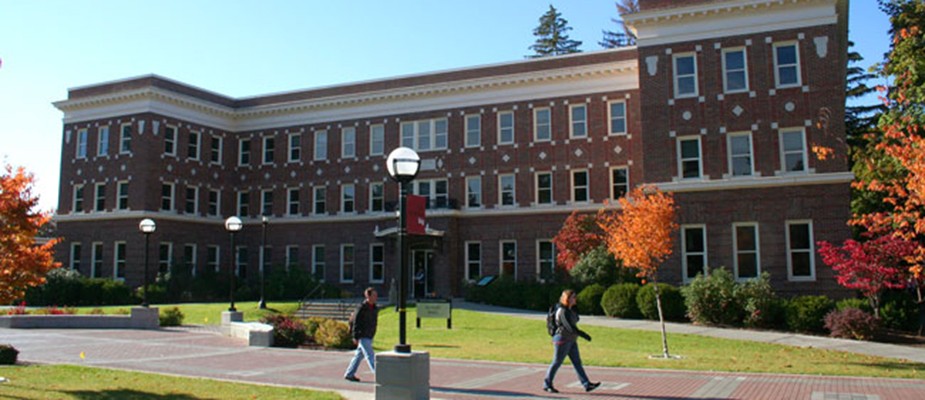“I learned things that I didn’t know, or that I was mistaken about.”
Associate Vice President of Facilities and Planning Shawn King could have been talking about any class on the EWU campus. But for King and about a dozen other Eastern staff members, this was an opportunity to learn how to help students, coworkers and even family or friends who might be experiencing a mental health problem.
“A good bit of students come in, they have anxiety, or they have a history of depression,” says Natalie Stine, a registered dietician in EWU Dining Services. “I’ve had incidents where I could kind of tell something was going on and I didn’t know how to properly respond. That’s why I took this training.”
It’s called Mental Health First Aid. Dori Roberts, advisor and coordinator for the Honors Program, echoes the need for it.
“Especially with Honors, we work with students who tend to be very high achieving and they worry a lot,” she says. “And because of that they can often times worry themselves into situations that need some help.”
Providing more help for people who are facing a mental health issue is exactly what trainers Tricia Hughes and Laura Gant are trying to do. Together they offered the initial training classes in February.
“We get lots of positive feedback from people as they are leaving the class,” says Hughes, senior director of Wellness and Recreation Programs at Eastern. “They appreciate the content and the material that they’ve received.”
“Even if you don’t interact with students very much, these are just useful skills overall for your colleagues, coworkers, friends or family––to kind of break down some stigma and get a little more education overall,” adds Gant, EWU’s health education coordinator.
Thanks to a grant received by Inland Northwest Health Services, Hughes and Gant were themselves able to take the trainer courses free of charge. Since completing their own certification, they’ve done at least a half-dozen training classes for EWU faculty, staff and students.
The 8-hour training is split into two days. Attendees must complete both to receive certification from the Mental Health First Aid Organization. Certification remains valid for three years.
“The class provides an action plan,” says Hughes. “When you see someone in distress, or maybe see some red flags that indicate a mental health problem is occurring, you can step in at that point and implement the action plan.”
The program is similar to CPR training. Those certified are not expected to be a medical professional; they are simply better equipped to assist someone in crisis. “It’s not diagnosing people. It’s not treating people,” says Gant. “Whether it’s a colleague or a coworker or a student that comes into some kind of mental health crisis or illness or concern, you just feel that you have a few more tools to manage that in the most effective way until they can get professional help.”
The trainees say the class lays the groundwork to start a conversation.
“It’s a tough subject, but if you get a little more comfortable to at least ask the first question, then the dialogue can start,” says King.
“I want to be approachable,” says Roberts. “I want them to know that I’m ok with the subject matter. They can come to me and we can talk.”
While the July class did not host any students, Hughes and Gant say they’ve had students in the past. Anyone at Eastern is welcome and encouraged to sign up.
As King points out, students might have the most success helping their peers. “If a student went to a training, they might be the first person to meet up with another student and have that confidence to reach out and say, ‘Hey, something looks like it’s going on, what can I do to help?’”
“We need to be doing everything in our power to try to keep the students in school. It’s our responsibility to make sure the students succeed academically and health-wise,” adds Stine, stressing the importance of the class.

Every other year EWU conducts the National Collegiate Health Assessment survey. Hughes says the 2018 survey showed an increase in student suicide ideation. More students also reported that they had been diagnosed or treated for mental health issues in the past year. Thus, she says, mental health is a big priority for the university.
“We want to be able to provide great support to the students and staff on this campus and one of the ways to do that is by providing the mental health first aid,” Hughes says.
EWU Health, Wellness and Prevention Services are always adding new classes. They can also accommodate requests from individual groups or departments. Here are the upcoming class dates:
- August 22 – one day 8:30 a.m.-5 p.m. class
- September 10 & 12 (this class is full)
- October 29 & 31
- November 19 & 21 (this class is full)
Classes are free for all EWU staff, faculty and students. You must attend both 4-hour classes to receive certification. Each class runs from 12-4:30 p.m. and lunch is included both days.
If you’re interested please call Health, Wellness and Prevention at 509-359-4279 to sign up. Space is limited and previous classes have filled up quickly.

